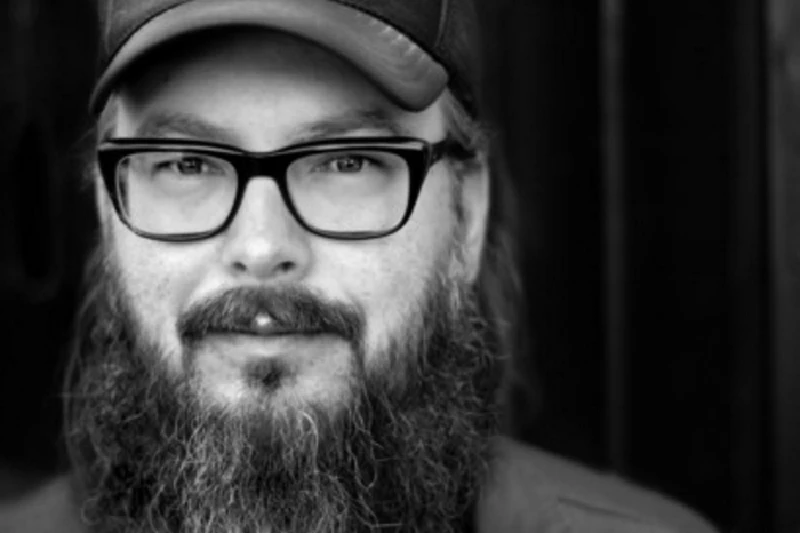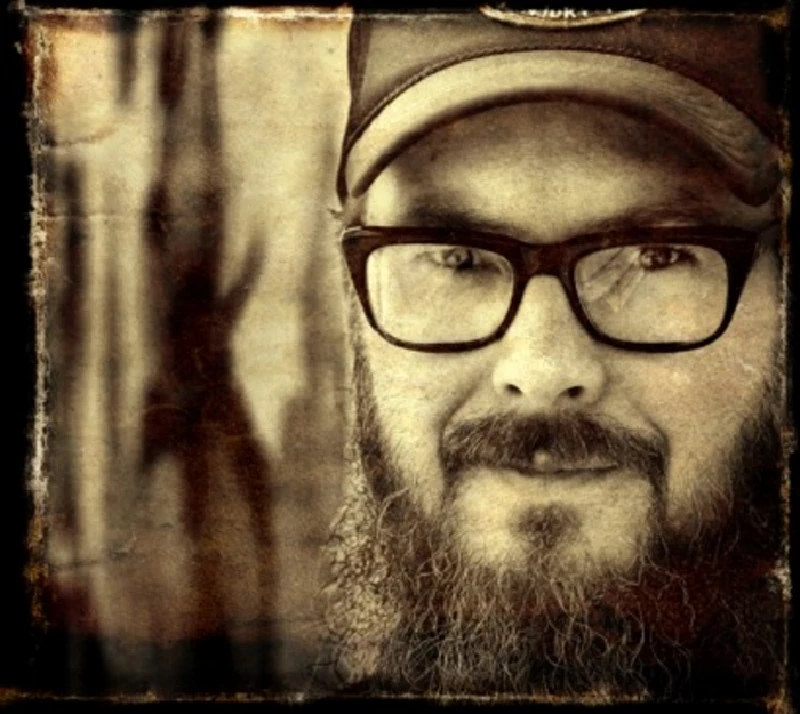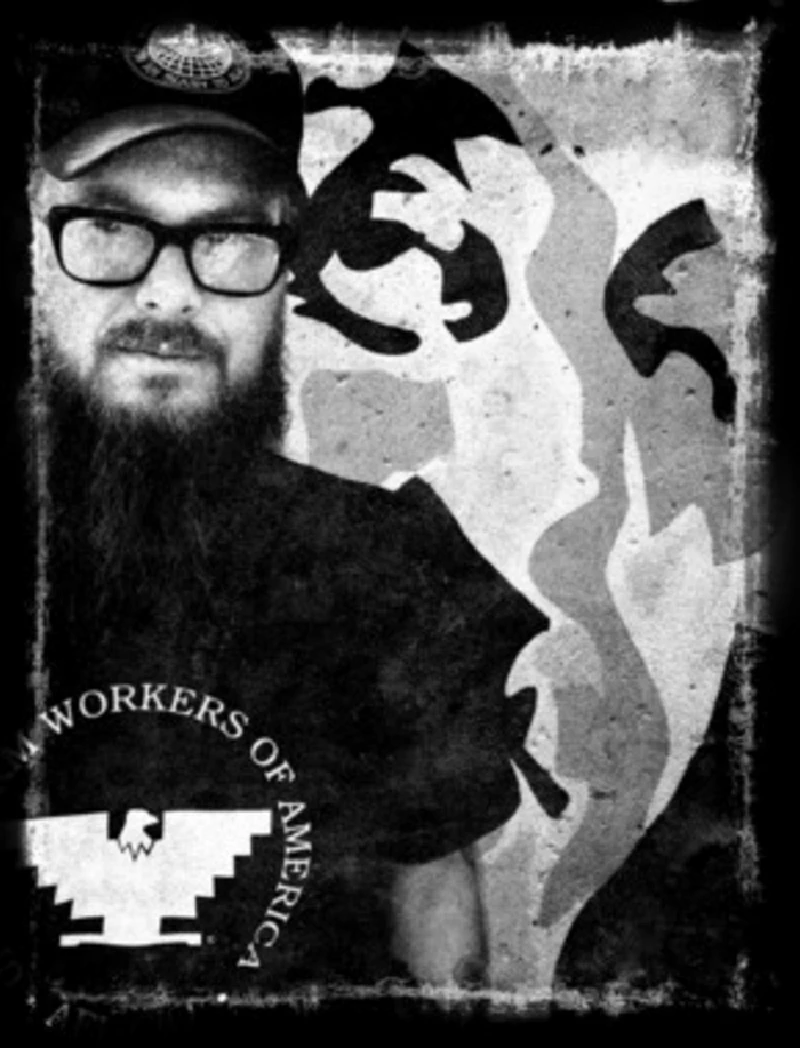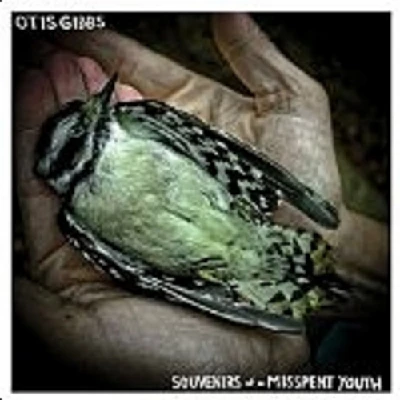Otis Gibbs - Interview
by Malcolm Carter
published: 25 / 6 / 2010

intro
Oklahama-based singer-songwriter Otis Gibbs speaks to Malcolm Carter about his recently released fifth album, 'Joe Hill's Ashes', and the political nature of much of his songwriting
Currently living in Sweden I was initially curious about Otis Gibbs new album, ‘Joe Hill’s Ashes’, as the Joe Hill in question was born in this Scandinavian country back in 1879 and a drawing of Hill adorned the album’s cover. Some of Hill’s ashes are apparently preserved in the wall of what once was a union office and is now part of the reading room of a library in a town very close to where I am writing this. Hill emigrated to the United States in 1902 and joined the Industrial Workers Of The World. He was executed by a firing squad in 1915. Otis Gibbs is not the first musician to write a song about Joe Hill, the Phil Ochs song probably being the most famous. So if the name of Otis Gibbs is new to you even though he has already released a handful of well-received albums then you’ll know from those opening lines that Gibbs could probably be classed as what we used to call a protest-singer. I doubt if Otis Gibbs would have any problems with being labelled such a singer. He has toured with Billy Bragg in the past which strengthens that connection but there is so much more to his music than just protest songs. Gibbs is the possessor of a voice that, while sounding like it’s coming from a man you certainly wouldn’t want to fall on the wrong side of, also displays an unexpected touch of gentleness. Like Bragg whose singing voice is also an acquired taste, Otis Gibbs can make the hairs on your neck stand up when he sings songs like the touching ‘When I Was Young’, where Gibbs recalls feeling safe in his mother’s arms, then have you rallying against the injustices of this world in his next song. Otis Gibbs makes records for those of us who can’t put into words how we feel about what is going on around us. Gibbs has one of those voices that just demands that you listen to him. It’s hard to pinpoint exactly why, but once the sound of that voice draws you in what Gibbs says in his lyrics will have you hooked. Gibbs' 2009 release, ‘Grandpa Walked a Picketline’, spent 6 weeks in the top 5 on the American Radio Chart and it also peaked at number 2 on the Euro Americana Chart. Before a tour of England, which opens in Plymouth on July 15th, Gibbs kindly spent some time answering a few questions that we put to him. PB: Before we ask a few questions about your musical career, it would be good to know a little about the photography that is shown on your web site. Did you study photography or has it developed just out of an interest? Those examples on your site are stunning. OG: Thank you for the kind words. I picked up a camera about 15 years ago while travelling through Oklahoma with my best friend, Todd Fox. He is a very talented photographer and he has taught me most of what I know. He has travelled with me throughout the years and we've done our best to document the things we were lucky enough to experience. It took me ten years of trial and error before I felt that I had honed my craft enough to show people my work. The process of learning the craft was humbling and frustrating and I almost gave up quite a few times. I'm glad that I've stuck with it and sharing these images with people has been more rewarding than I ever could have imagined. PB: Your bio states that you first stepped on stage at the age of four and then sang in bars while your uncle was looking after you. It seems that you went through a good number of jobs after leaving school before ‘dropping out’ and writing and performing. Do you think the seed was planted at that very young age which made you want to be a performer? OG: Music was always around when I was growing up. It was just a normal part of my life. My grandfather played bluegrass music and I loved sitting around listening to him. My dad loved drinking beer and playing Jerry Lee lewis and Chuck Berry records every Friday and Saturday night. He'd turn up our little crappy record player as loud as it would go and sing along at the top of his lungs. I don't think I ever made a conscious decision to become a musician. It just came naturally. PB: You’re obviously picking up quite a following especially from your tours in the States and the U.K. How have things changed for you since you made your first album? OG: Life is strange sometimes. Things improve so slowly and at such a cost that we don't often notice the improvements once they've finally arrived. I try to remind myself of how fortunate I am to be able to do this. The best improvement over the last five or six years is that now, when I make a record, I know that there is an audience that will give it an honest listen. They may or may not enjoy it, but they've enjoyed my past work, so they'll give the new record a chance. PB: Although maybe best known for your political songs you also record just as many songs detailing the lives of the average, and not-so-average, person. Which are the easiest to write? OG: I honestly just write about what's on my mind. Sometimes it's like pulling teeth and other times it feels effortless. I don't think there's any common denominator for the easy ones. PB: Do you mainly write from your own experiences or pick up ideas from people you meet? OG: A little of both. PB: Who has influenced your music? In a way you come from the same stock as Billy Bragg and you’ve toured with him which strengthens that connection. Do you feel that there is a link with artists like Bragg and yourself? OG: Billy is a beautiful man and he's been a great friend and mentor. He's extremely down to earth and is a joy to be around. Perhaps our biggest similarity is that we are doing what comes naturally and are comfortable in our own skins. PB: “Mixing pop and politics he asks me what the use is/I offer him embarrassment and my usual excuses.” I’m sure you’re aware that comes from ‘Waiting for The Great Leap Forwards’, one of Bragg’s songs. So, do you feel that mixing the two can make a difference? OG: That's a great song! I find it very hard to explain myself on this sort of question, so I hope this comes out right. Some people are comfortable with words like "politics", but I've always had a hard time with it. No one ever referred to the Carter Family as a "political band" when they were singing songs about the Great Depression. I'm curious why we feel the need to categorize art in this way. When I think of politics, I think of dirty deals done in dark rooms by people with influence and power. Those people then impose those deals on the rest of us. My work reflects me as a person and as an artist. I get bored when listening to artists who write nothing but boy meets girl songs. There's a big world out there with a lot of things to document and draw inspiration from. I choose to write about all aspects of life and I hope that people understand that I don't see myself as an evangelist in any way. I make no apologies for who I am, but I'd rather not be crammed into anyone else's boxes. PB: With no exceptions every person I’ve played ‘Joe Hill’s Ashes’ to, who were unfamiliar with your previous albums, has expressed interest in you. It’s made people sit up and listen. That proves how powerful the medium of music still is. Would you agree? OG: That's very nice to hear. I love listening to music and letting it take me wherever it will. It's very humbling to know that there are people I've never met who are taking those same journeys with my music! PB: Is it important to you to get across your views on things that concern you in your songs? I can’t see you being satisfied if you had to record an album that wasn’t really you just to widen your audience. OG: I'm just doing what feels natural. I've never had any delusions of becoming rich and famous. I'm lucky to be able to make an honest living as an artist. That's all I've ever hoped for and it's probably more than I deserve. I can't over emphasize how important it is to make records that you like and to not compromise in any way. You can't control whether or not the world ever hears your record, so why not make the music you want to make and the hell with what other people think. PB: There’s honesty in your writing and also in the way you sing and present your songs. You’re believable and I think that’s why your songs touch and affect so many people. Do you think your background and the way you have lived your life contributed to this? OG: If nothing else, it's given me some interesting stories to share with people. I'm comfortable with who I am and I'm not afraid to admit my many flaws and I think people appreciate that. PB: The problem now is that for those of us who live in parts of Europe where you have yet to tour and so have only recently discovered your music is that it’s impossible to buy your early albums except for ‘Grandpa Walked a Picket Line’. Titles like ‘49th and Melancholy’, One Day Our Whispers’ and ‘Once I Dreamed of Christmas’ are frustratingly out of print. Are there any plans to re-issue these albums now your fan-base is growing? OG: I'll have all of them re-issued later this year. Keep watching my website (otisgibbs.com), but until then, you can download all of my albums at otisgibbs.bandcamp.com. PB: Do you have a personal favourite out of the five albums you have released so far? One that means the most to you for any reason? OG: No favourites, but Joe Hill's Ashes was the most rewarding album I've made. It was done in a short period of time and we had a whole lot of fun recording it. PB: You’re touring the U.K. this summer. What plans do you have after that? OG: I'll be touring the UK, Ireland and Holland until the Fall. PB: Are you taking a band on that tour or is it just you solo? OG: It will be me playing solo. PB: Finally, what music are you currently listening to? PG: Adam Carroll - 'Lookin' Out The Screen Door'. It's one of the best under heard records of the last ten years and I highly recommend it to people who like Townes Van Zandt, Guy Clark, John Prine etc. PB: Thank you.
Band Links:-
http://otisgibbs.com/https://www.facebook.com/OtisGibbsMusic
https://twitter.com/otisgibbs
Picture Gallery:-


soundcloud
reviews |
|
Souvenirs of a Misspent Youth (2014) |

|
| Gritty but melodic latest album from Indiana-based folk artist and political activist, Otis Gibbs |
| Harder Than Hammered Hell (2012) |
| Joe Hill's Ashes (2010) |
most viewed articles
current edition
Carl Ewens - David Bowie 1964 to 1982 On Track: Every Album, Every SongArmory Show - Interview with Richard Jobson
Colin Blunstone - Thalia Hall, Chicago, 16/7/2025
John McKay - Interview
Visor Fest - Valencia, Spain, 26/9/2025...27/9/2025
Bathers - Photoscapes 1
Billie Eilish - O2 Arena, London, 10/7/2025
Loft - Interview
Robert Forster - Interview
Sir Tim Rice - Interview
previous editions
Manic Street Preachers - (Gig of a Lifetime) Millennium Stadium, Cardiff, December 1999Heavenly - P.U.N.K. Girl EP
Beautiful South - Ten Songs That Made Me Love...
Oasis - Oasis, Earl's Court, London, 1995
Prolapse - Interview
Boomtown Rats - Ten Songs That Made Me Love....
Trudie Myerscough-Harris - Interview
Peter Perrett - In Dreams Begin Responsibilities Interview Part One
Coldplay - Wembley Arena. London, 16/8/2022
Pixies - Ten Songs That Made Me Love...
most viewed reviews
current edition
Davey Woodward - Mumbo in the JumboAmy Macdonald - Is This What You've Been Waiting For?
Sick Man of Europe - The Sick Man of Europe
Phew, Erika Kobayashi,, Dieter Moebius - Radium Girls
Alice Cooper - The Revenge of Alice Cooper
Lucy Spraggan - Other Sides of the Moon
Bush - I Beat Loneliness
Suzanne Vega - Flying With Angels
Blueboy - 2
Cynthia Erivo - I Forgive You
Pennyblackmusic Regular Contributors
Adrian Janes
Amanda J. Window
Andrew Twambley
Anthony Dhanendran
Benjamin Howarth
Cila Warncke
Daniel Cressey
Darren Aston
Dastardly
Dave Goodwin
Denzil Watson
Dominic B. Simpson
Eoghan Lyng
Fiona Hutchings
Harry Sherriff
Helen Tipping
Jamie Rowland
John Clarkson
Julie Cruickshank
Kimberly Bright
Lisa Torem
Maarten Schiethart